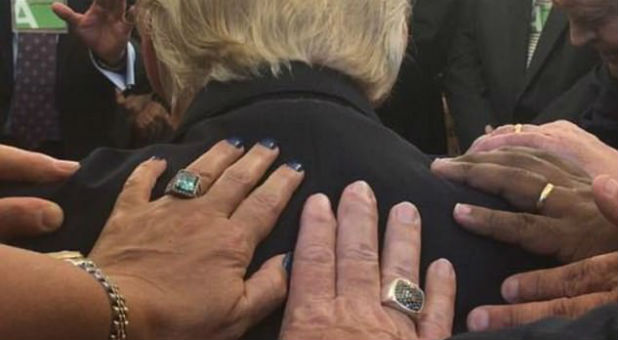Will the Religious Left Succeed in Their One Goal?
The religious right and left may disagree on a lot of things, but the importance of prayer shouldn’t be one of them. Yet when a picture circulated of evangelical leaders laying hands on Donald Trump in the Oval Office, even self-described Christians pitched a fit.
Reverend William Barber, president of the North Carolina chapter of the NAACP was absolutely beside himself on MSNBC, arguing that it was a form of “theological malpractice bordering on heresy” for Christians like me to intercede for the leader of the free world.
As far as Barber is concerned, you shouldn’t “p-r-a-y for a president and others when they are p-r-e-y, preying on the most vulnerable. You’re violating the most sacred principles of religion.” Obviously, Barber wasn’t nearly as upset about the prayer as he was about evangelicals’ access to the president they helped elect. Had a photo surfaced of Christians praying over Barack Obama, I guarantee the reverend’s response would have been far different.
To most people, Barber’s accusations were outlandish. So much so that the head of the North Carolina Republican Party fired back, insisting she was “shocked and outraged” at his insinuation. “Using his role as a supposed faith-based leader to falsely drive citizens away from praying for the good of our nation and our nation’s president is absolutely grotesque. The idea that it is a sin to pray for any individual, much less the commander in chief of our country, goes against any religious teaching that I have ever heard of.”
Unfortunately, Barber isn’t the only “faith leader” to question Trump’s relationship to evangelicals. John Fea, a professor at Messiah College, took aim at the president in a Washington Post column earlier this month called “Trump Threatens to Change the Course of American Christianity.” He starts by labeling the White House’s religious base as “court evangelicals,” his term for “a Christian who, like the attendants and advisers who frequented the courts of monarchs, seeks influence through regular visits to the White House.” When I hear the phrase “court evangelicals,” I think of Scripture’s Daniel, Joseph and others who brought their faith into the presence of the king—people whom God strategically placed to influence leaders for the benefit of an entire nation. But Fea doesn’t mean it as a compliment. On the contrary, he accuses them of “changing the religious landscape in the United States” and “alter[ing] long-standing spiritual alignments.”
For the last 50 years, he argues, “evangelicals have sought to influence the direction of the country and its laws through politics. But Trump has forced them to embrace a pragmatism that could damage the gospel around the world and force many Christians to rethink their religious identities and affiliations.” Fea insists that Trump has done little for evangelicals, a charge hardly substantiated by the strides the White House has made on our pro-life and religious liberty agendas. But Fea measures Trump’s sincerity on a different scale: how often he attends church. No wonder he once called Barack Obama “the most explicitly Christian president in American history.” In a column from 2012, he made the staggering claim that the most pro-abortion, anti-faith president to ever occupy the Oval Office was also the most pious.
It’s a startling suggestion until you consider that Fea and other religious liberals judged Obama on his words, not his ungodly policies. “If we analyze his language [emphasis mine] in the same way that historians examine the religious language of the Founding Fathers or even George W. Bush, we will find that Obama’s piety, use of the Bible, and references to Christian faith and theology put most other American presidents to shame on this front. I think there may be good reasons why some people will not vote for Obama in November, but his commitment to Christianity is not one of them.” His record makes clear that President Obama’s only commitment to Christianity was to drive it underground.
I can’t speak to Donald Trump’s personal faith walk. But I can say that he shares some of evangelicals’ deepest concerns. And although we don’t agree on everything, I fail to see what’s lost by exposing the president to the same God Fea and Barber claim to worship? Isn’t it good for him to be exposed to faith?
Obviously, Fea, Barber and others on the religious left have one goal: pushing Christians away from political engagement. But the truth is this: our government is only as good as the character of the people managing it—and the people influencing them. On this point, I do agree with Fea—Christians should never place access over the accountability of Scripture. We should never desire a seat at the table so much that we would compromise the truth to be there. Rather, we should speak truth wherever we are. And as far as I’m concerned, that applies from the White House to our own house. {eoa}















































